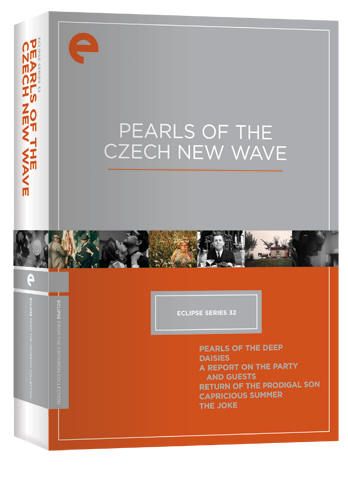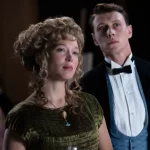Home Video Hovel- Pearls of the Czech New Wave, by Scott Nye
 Whenever I get questions like, “Scott, what’s up with all the foreign films? It’s not like they’re inherently better or anything, so why all the love?” I say, “you are right, sir or madam, they are not inherently better. The reason so many of us cinephiles latch onto foreign cinema is because of the diversity of expression, perspectives, types of stories, and approaches to the medium. On a superficial level, it’s different and new and exciting, but on a deeper level, it expands our idea of cinema and gets us a little bit acquainted with a culture different from our own.” Except if we’re having this conversation in person, in which case I am much, much less eloquent. The point is, nothing says new perspectives and aesthetic tastes than a good old-fashioned New Wave, and the new release from The Criterion Collection’s Eclipse Series, Pearls of the Czech New Wave, is a perfect primer on a type of cinema, a range of expression, and a moment in time that is simply a joy for those with just such a mindset.
Whenever I get questions like, “Scott, what’s up with all the foreign films? It’s not like they’re inherently better or anything, so why all the love?” I say, “you are right, sir or madam, they are not inherently better. The reason so many of us cinephiles latch onto foreign cinema is because of the diversity of expression, perspectives, types of stories, and approaches to the medium. On a superficial level, it’s different and new and exciting, but on a deeper level, it expands our idea of cinema and gets us a little bit acquainted with a culture different from our own.” Except if we’re having this conversation in person, in which case I am much, much less eloquent. The point is, nothing says new perspectives and aesthetic tastes than a good old-fashioned New Wave, and the new release from The Criterion Collection’s Eclipse Series, Pearls of the Czech New Wave, is a perfect primer on a type of cinema, a range of expression, and a moment in time that is simply a joy for those with just such a mindset.
The structure of the box set, if a box set could be said to be structured, is pretty clever in and of itself. The first film is Pearls of the Deep, from whence the collection undoubtedly takes its name, which is itself an anthology of five short films from five different directors, and each subsequent feature is directed by one of those filmmakers. So in that way, it also provides a miniature look at five directors with whom you might not be terribly familiar. Based on short stories by Bohumil Hrabal, whose work helped light the match on the Czech New Wave, the anthology is by turns deadly funny, morbid, curious, ponderous, sweet, and incising, much as the films to follow.
Věra Chytilová’s “Restaurant at the End of the World” could never quite prepare you for the absolutely screaming rage of cinematic repression that is her Daisies, in which two women basically just say, “well screw this” and set off to blow the lid of the patriarchy, the hierarchy, and general ideas of good taste. That almost puts too fine a point on their actions, which include cycling through men they’ve wrung dry, making a scene at all the finest restaurants, trashing parties that have yet to be started, and dismantling very obvious phallic symbols. They still indulge in the company of men for pleasure, but it is first and foremost for their pleasure. The men are incidental players in their game.
Chytilová at once undercuts and enhances her political mission by staging all of this as a farce, a bit of madcap comedy that takes its cues as much from the silent era as it does feminist literature. Never mind her aggressive editing and color scheme, which switches filters on a dime, electrifying the frame in a very punk-rock manner that could be said to inform Tony Scott’s later work, if I could only prove he’s actually seen this. But like the best punk rock (and unlike Tony Scott), Chytilová’s battle cry has purpose beyond the aesthetic (not that it’s necessary, of course), practically daring the Communist regime to take her down, even as she’s setting fire to the palace. They did, naturally, ban the film (chiefly, as Michael Koresky reveals in his essay, for food wastage), but its legacy extends well beyond such concerns. By comparison, “Restuarant at the End of the World” seems quite tame, but exploring as it does the ramifications of a body in the back room of a restaurant beneath a wedding, it’s quite a haunting experience itself, and ends with the kind of formal audacity that anticipates her landmark film.
While Marie I and Marie II, the principal players in Daisies, are a kind of symbol for the undercurrent of discontent boiling in Czechoslovakia at the time, Jan Němec’s A Report on the Party and Guests is the kind of deep political allegory that turns me on (intellectually-speaking, of course) almost reflexively. In his almost Buñuelian set-up, a group of upper-class socialites attend a lavish party, enjoying a short picnic to themselves beforehand. As they make their way towards the main event, they are accosted by a large group who intimidate them (without force or any sign thereof) into following them and participating in a series of arbitrary instructions – “stand further apart! It’s for your own good” – that are designed purely for the ringleader’s own amusement. Němec is clearly asking why people go along with activities that have no benefit to them, either by improving their life station or maintaining it, all because they are simply told to or hassled if they don’t.
The film goes on from there, continuing much in this same way while changing the circumstances – a great effort is put into making sure people sit in their assigned seats, etc. – and Němec lends the affair just the right surrealist touch. He never calls attention to the absurdity, treating it as perfectly natural while allowing the heightened performances to tell us just how unnatural it is. It makes for a rather perfect pairing with his Pearls short, “The Imposters,” in which two old men reinvent the story of their lives for the sake of each other.
As students of FAMU, the national film school in Prague, the directors collected in this set and many others had the privilege to see films from European masters such as Godard, Fellini, Antonioni, and Bresson, who were otherwise off-limits in public Czech theaters. Their influence is deeply felt in many of these films, none perhaps more so than in Evald Schorm’s The Return of the Prodigal Son, which affects much of La Dolce Vita and 8 ½ with the miserablism of Ingmar Bergman and the thematic resonance of Antonioni. In it, a very Mastroianni-esque Jan Kacer plays an engineer, with whom he shares his forename, who is recovering from his recent, unexpected attempted suicide. The usual motions are attended to, with Jan’s coworkers exclaiming that they don’t know how this could have happened and he was the most ambitious of the lot and so forth, but ultimately Jan reveals himself to be totally unpredictable, asserting that people have a duty to following their desires to whatever conclusion they may hold.
The themes the film explores are fascinating, revolving chiefly around the everyday moral compromise one has to make in order to live a fulfilling life, and in a certain micro sense, Shorm’s decisions are admirable. For instance, though he initial posits Jan as a sort of existentially-adrift truth seeker, he gives just as much weight to the opposing side, positing them not as weak and given to compromise but as realists with the moral fortitude to support such facades. But for all his dramatics, Schorm doesn’t quite form a piece of drama, and is relatively tame in his cinema. When one thinks of Bergman or Antonioni, the miserablism is undoubtedly a part, but they fashion their meditations on the state of the soul into something more malleable and, in a certain sense, entertaining. Schorm fashions his meditations into moments, not a whole.
Unimpressed though I was with Jiří Menzel’s landmark film Closely Watched Trains, I was rather delighted here with Capricious Summer, a rather simple film about the sexual comings-and-goings of a bathhouse owner, his wife, a one-man circus, his beautiful assistant, a priest, and a military man. Despite the morbid humor of his Pearls short, “Mr. Baltazar’s Death,” Menzel was never one for the grand statement, and of all the New Wave films, this is the least New Wave-y. If there’s anything remotely revolutionary, it’s in exposing the sexuality that drives most men’s (and not a few women’s) decisions, which stands in stark contrast to the relatively chaste social realist films that Communist regimes demanded, in which any sexual exploration was frequently punished. But Menzel’s cinema is so light and carefree that it not only saw release in Czechoslovakia, but quite a lot of success, and went on to open the 1968 New York Film Festival.
It’s somewhat ironic that it share a disc with Jaromil Jireš’ The Joke, easily the most overtly political film of the bunch, in which a jealous boyfriend’s snide remark about Trotsky gets him kicked out of the Communist Party during the Stalin regime. We follow the repercussions of this a decade hence, after he’s been forced into a wing of the military designed for similar outcasts, a stint in prison, and the mines, when he decides to hatch a revenge scheme against the man who condemned him. This isn’t exactly the revenge of Tarantino or Oldboy; it’s much more deceitful and conniving, and but just as ultimately costly.
When Criterion launched the Eclipse series, they did so with the intention of keeping the sets affordable while presenting “lost, forgotten, or overshadowed films.” They also made it clear that while the materials would be the best they could get their hands on, they wouldn’t undergo full restorations, taking a kind of “you get what you get” approach. As such, the films in Pearls of the Czech look fine, though hardly exceptional. They very much feel like video renditions of celluloid sources, replete with noise from both arenas, contrast issues, and damage marks. One would be hard pressed to complain about them too much, as they contain none of the issues of more overtly problematic mainline Criterion releases that suffer from poor source material, but they just are what they are. In particular, color stock in Eastern Europe at the time was not what one might call ideal; it was frequently blown out and a little faded. Of the stuff I’ve come across, only Tarkovsky managed to really make it look good within its limitations, and while Chytilová practically turns it on its head with Daisies, the rest of the films suffer somewhat from this technical restraint, which is compounded on video.
In a further effort to keep these films affordable, we get no supplemental material, save for a series of essays by Michael Koresky, which provide extremely helpful insight into the cultural forces at work behind these films.
On the whole, this is a very cool set Criterion has put together, and goes a long way to distinguish Czech cinema as one with its own concerns, both aesthetic and thematic, while not presenting an overly limited view. Like the French New Wave, one gets a whole range of ideas that are nonetheless marked by youthful enthusiasm to tear down the past.































I absolutely agree with your opening paragraph, getting acquainted with a different culture is the primary reason I love foreign films. For that I’m so glad Criterion is finally giving the Czech New Wave its due. I really hope that this set sells well so that they can continue to release more Czech films, there are so many wonderful titles from that era that have been neglected for far too long.
Same here! Also, I dig your handle. I’ll be diving into that film in an upcoming piece. Hope to do it justice.